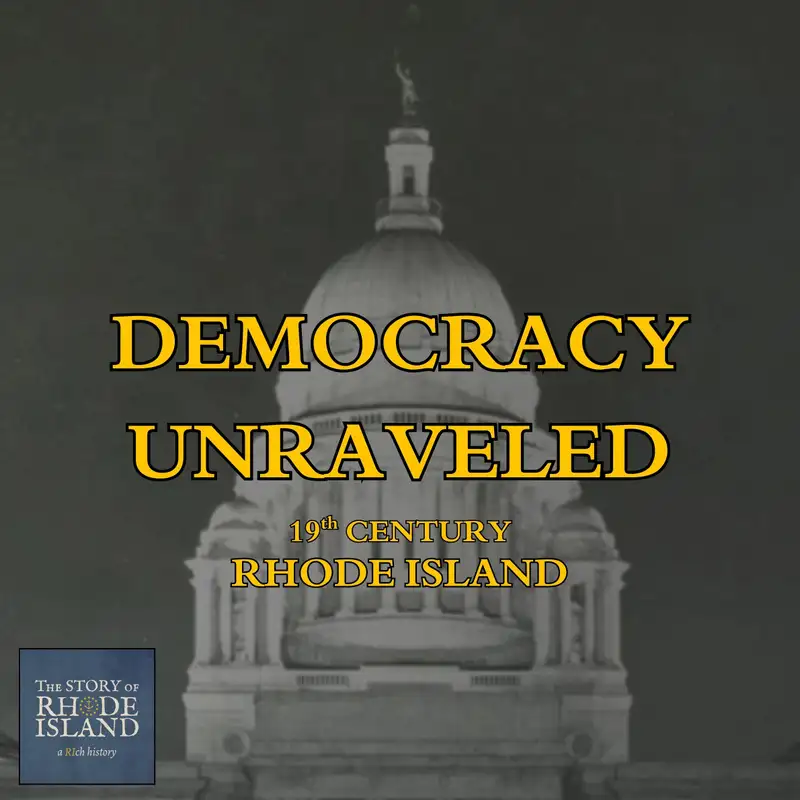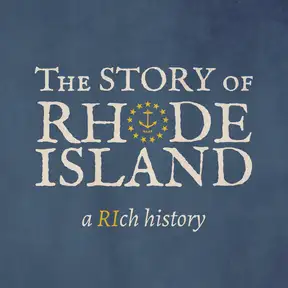
BONUS: Democracy Unraveled | 19 Century Rhode Island
Hello. This is Kevin Padula, creator and host of the story of Rhode Island. A quick reminder before we get started. This episode was created for the YouTube channel where you'll get the full experience with visuals, maps, and animations that really bring Rhode Island's history to life. If you're listening on Apple Podcasts, Spotify, or another app, the audio is here for you.
Kevin Padula:But for the best experience, I recommend heading over to the Story of Rhode Island YouTube channel. Alright. And with that, let's get into today's story. On the eve of the American Revolution, Rhode Island was the most democratic society in America. I mean, it was so democratic that the nation's founding fathers actually feared that it could spiral into anarchy.
Kevin Padula:With their broad voting rights, and power to elect nearly every one of their government officials, the average Rhode Islander held an extraordinary amount of political power. But by the 1840s, everything changed. And Rhode Island had become the least democratic state in the nation. It was a place where voting rights were tightly restricted, and representation wildly unfair. So what happened?
Kevin Padula:How did America's most democratic colony become the nation's least state over just the course of a few generations? Well, that's exactly what we're going cover today. This is the story of Rhode Island, and I'm going to tell you the tale of when democracy came unraveled in nineteenth century Rhode Island. In order to truly understand just how much Rhode Island's democracy came unraveled in the eighteen hundreds, we first need to understand just how democratic its government once was. And to put it simply, Rhode Island's government in the seventeen hundreds was truly unique.
Kevin Padula:For instance, let's start with the number of people who could vote. Due to the dominant middling character of its people, it was relatively easy for the average Rhode Islander to acquire the £40 worth of real estate that was needed to become enfranchised. And because of this, 75 to 80% of adult white males could vote. That's a rate of suffrage that was higher than any other place in the world at the time. And not only could an abnormally large percentage of the population vote, but they were also given the power to elect nearly all of their government officials something else that was incredibly unique for its time.
Kevin Padula:When speaking about Rhode Island, renowned historian Gordon Wood has stated that in no other North American colony did the people at large directly elect all of the officers of their central government. And so because of the colony's rate of suffrage, and its government that was primarily elected by the people, Gordon Wood has also stated that Rhode Island was the most democratic colony in the entire British Empire. I mean, it was so democratic that some of the nation's leaders actually looked down on Rhode Island's government. Because remember, even though many Americans were fed up with being ruled by a monarch, they also feared a society that was too directly controlled by the people because they thought it would lead to mob rule. It's for this reason why, when speaking about Rhode Island in 1772, the Chief Justice of New York despairingly called Rhode Island a downright democracy, a society entirely controlled by the populace and a place that was teetering on the verge of anarchy.
Kevin Padula:In fact, when building the foundation for The United States' new government, America's founding fathers feared that their nation would become as democratic as Rhode Island. In Federalist Paper 10, James Madison spoke to the shortcomings of a government like Rhode Island when stating, The instability, injustice, and confusion introduced into the public councils have been the mortal diseases under which popular governments have everywhere perished. And so did Madison and other founding fathers, Rhode Island represented a political system they desperately wanted to avoid. And to be honest, one can see where they're coming from because Rhode Island's eighteenth century political system was not without its flaws. Aside from more modern shortcomings, like only a tiny number of black being able to vote and women being completely excluded from the electoral process, Rhode Island's government was also riddled with factionalism, filled with politicians who often bought votes, and a justice system that sometimes bent to the will of those in power rather than the rule of law.
Kevin Padula:But just because it was flawed doesn't mean it wasn't a radical democracy. Because compared to the rest of the Western world, Rhode Island's democracy was well ahead of its time. And with their high rates of suffrage and ability to elect nearly all of their government officials, the average Rhode Islander held an extraordinary amount of political power. But that civic environment didn't last. Because over the course of Rhode Island managed to become the least democratic state in America, a place where voting rights were heavily restricted and political power was concentrated in the hands of a few.
Kevin Padula:So how did that happen? What were the factors that possibly could have led to the people in Rhode Island becoming so politically powerless? Well, at the end of the day, Rhode Island's democratic decline came down to two big forces working rapid industrialization and the state's leaders refusing to alter their government. Let's start with industrialization. After the first successful textile mill opened in 1793, Rhode Island transitioned away from a society built on farming and trade to one heavily reliant on manufacturing a change that primarily took place in the northern part of the state.
Kevin Padula:As a result, the towns in that area experienced rapid population growth and a surge of property less, lower class citizens. Citizens. This negatively affected Rhode Island's democracy in a couple of ways. First, since every town except the original four only sent two delegates to the General Assembly, the more populous northern towns were left significantly underrepresented. Second, with more people working low paying factory jobs, fewer adult white men met the real estate requirements to vote, sharply reducing the share of the population that was enfranchised.
Kevin Padula:Even the few black Rhode Islanders who had been able to vote in the past lost that right when the General Assembly took it away from them in 1822. These setbacks could have been resolved if those in power simply decided to alter their government to meet the needs of their new Unfortunately, they refused to do such a thing because many landowners from the smaller, rural towns knew that as long as the established mode of representation and real estate requirements were in place, they would remain in control of the state government. On top of that, they also believed that working class citizens lacked the judgment to vote, and their prejudice towards Irish Catholic immigrants made them wary of extending suffrage beyond the Protestant community. Therefore, the landholding factions from Rhode Island's rural towns created a formidable ballwork in defense of the state's archaic political institutions. And as the economy became more industrialized year after year, these problems grew even worse.
Kevin Padula:For example, by 1840, representation had become so unbalanced that the rural town of Jamestown had one representative for every 182 residents, while Providence had just one for every 5,700. Residents. But what really infuriated the people was how difficult it was for the average citizen to become enfranchised. By 1840, only 38 of adult white males could vote. And some towns like Providence and North Providence had rates as low as just 29%.
Kevin Padula:I mean, that's an insane decrease considering it was around 75% during the American Revolution. Now all that is bad enough. But to make it even worse, while Rhode Island's democracy was on a steep decline, democracy across the rest of America was on the rise. Because in the early nineteenth century, Jeffersonian and Jacksonian democratic ideals inspired many states to drop the property requirements for voting, thereby extending suffrage to more people than ever before. Between 1800 and 1840, the percentage of adult white males who were eligible to vote across America rose from around 60% to 90%, far higher than Rhode Island's rate which remained stuck at thirty eight percent.
Kevin Padula:A great case study of this dichotomy is the eighteen forty presidential election, an election where populist politics ran high and people came out in droves to vote. In most states, about 78% of adult white males voted in the election. But in Rhode Island, only about 33% voted, the lowest in the nation. And so imagine how infuriating this must have been for the average working class Rhode Islander. I mean, it was just a couple of generations ago when your society was known to be a trailblazer of democracy, a place filled with people who had an immense amount of political power.
Kevin Padula:But by the eighteen forties, that drastically changed, and the average individual had little to no political power. Unable to vote or hold office, the working class people of Rhode Island were pushed down to a state of political irrelevance and forced to watch a minority group of landholders control their government. But eventually, like a dam buckling under pressure, that pent up frustration burst wide open, and the people came pouring out of factories and taking to the streets in protest. While being led by a fiery young lawyer named Thomas Wilson Dorr, working class citizens ignited a political upheaval that boldly attempted to dismantle their archaic political institutions and create a new government, one that would once again be ruled by the people. Their actions would become one of the most tumultuous events in Rhode Island history and forever be known as the Dorr Rebellion.
Kevin Padula:But if you wanna learn more about that story, you'll have to dive into season three, episodes four and five of the story of Rhode Island podcast. Thanks for watching, and don't forget to subscribe for more fascinating tales about the history of Rhode Island. Thank and you for listening to the story of Rhode Island. If you are enjoying the podcast, please be sure to leave a review and to follow the podcast as well. If you'd like to learn more about today's episode and others as well, you can visit storyofrhodeisland.com.
Kevin Padula:You can also follow me on Instagram at story of Rhode Island or on Facebook at the story of Rhode Island podcast. Thank you again, and see you next time.
